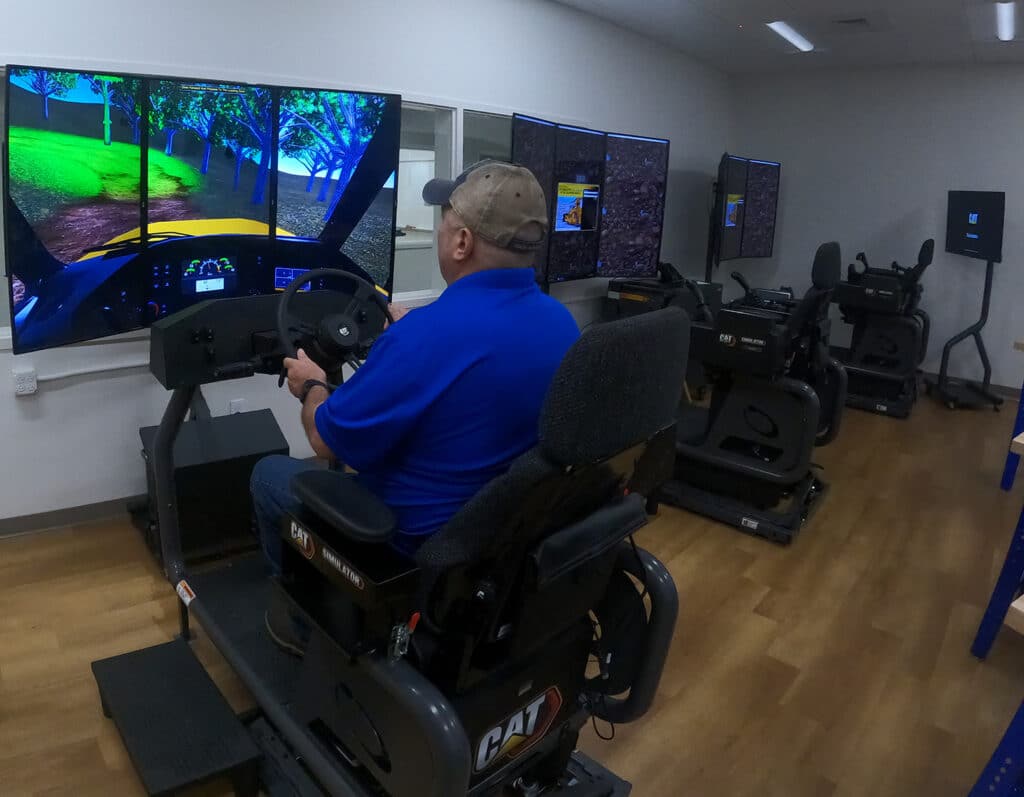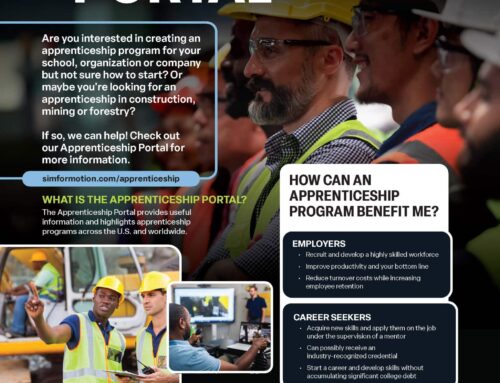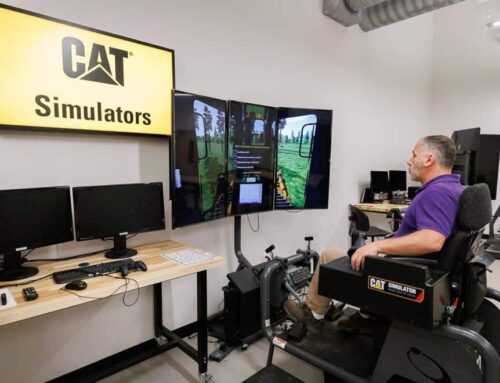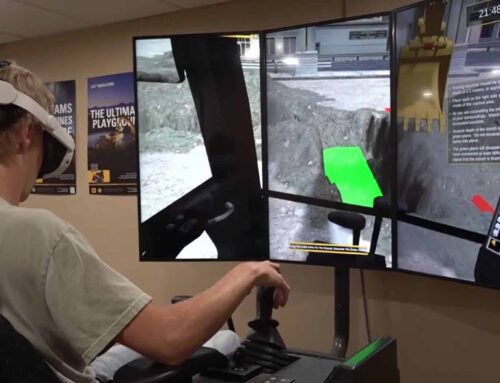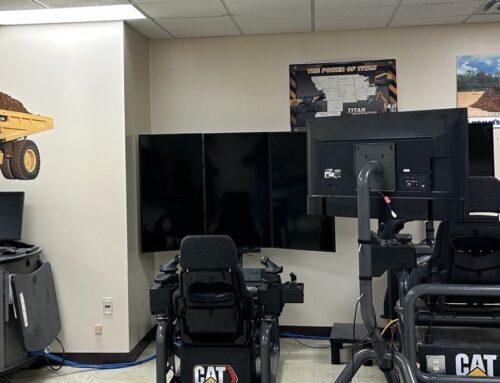Tennessee College of Applied Technology Knoxville’s (TCAT) Special Industry Instructor Jose Miranda credits his background in mechanics along with his previous role as an automotive instructor for giving him insight on how students enrolled in TCAT Knoxville’s heavy equipment operator course learn best. Miranda believes he has found the perfect learning mixture.
“I find the best way for my students to learn is with a mix of instructor-led learning with the SimScholars™ curriculum then hands-on training on Cat® Simulators,” explained Miranda who appreciates the details SimScholars™ curriculum provides his students. “The curriculum gives the students the reasons why they need to maneuver the machine a certain way even before they get on the simulator. It also gives them information they will need when they are on the job site like safety, hazard awareness and machine operation.”
Miranda added that he believes students who only use simulators for training do not necessarily receive the in-depth learning the curriculum provides. “The curriculum goes deeper into things like type of soils, bucket load formulas and more. It’s more well-rounded instead of just two hands on the simulator. I think to be a good operator, you have to have both. You can’t just have the hands-on training,” said Miranda.
TCAT Knoxville’s heavy equipment operator students have the opportunity to learn how to operate three pieces of heavy equipment on the college’s three Cat Simulators systems – the Articulated Truck, Hydraulic Excavator and Dozer.
“I find the best way for my students to learn is with a mix of instructor-led learning with the SimScholars™ curriculum then hands-on training on Cat® Simulators,” explained Miranda who appreciates the details SimScholars™ curriculum provides his students. “The curriculum gives the students the reasons why they need to maneuver the machine a certain way even before they get on the simulator.
Partnerships Provide Real Machine Experience
“We have partnerships with Blount Excavating and the Caterpillar dealership, Stowers Cat®, here in Knoxville, Tennessee,” explained Miranda. “Stowers let the students go to their yard and get some in-the-seat stick time. But first, the students have to do Excavator and Articulated Truck walkarounds at Stowers’ yard.”
After spending time on the simulators familiarizing themselves with the authentic Cat controls and learning the basics of maneuvering the machines, the students return to Stowers’ yard, explained Miranda. “During the third week of the course, we go back to Stowers’ yard. The students get into the equipment and do air digging, like ‘raking the green.’ They also move and swing the machine around the track a little bit.”
Authentic Cat Controls
Miranda explained that learning on the authentic Cat controls makes a difference. “The students like that the Cat controls are the same as the real machine’s controls,” said Miranda who added that the muscle memory the students develop from the Cat controls is important too. “When we went back to Stowers’ yard, they were not newbies. They were actually digging. They were moving the bucket up and down; they were safe about it.”
He continued, “They only needed a little instruction from one of the Cat trainers and me. That’s all they needed. In the first hour or so, they were getting used to the machine. But then after that, they were running on their own.”
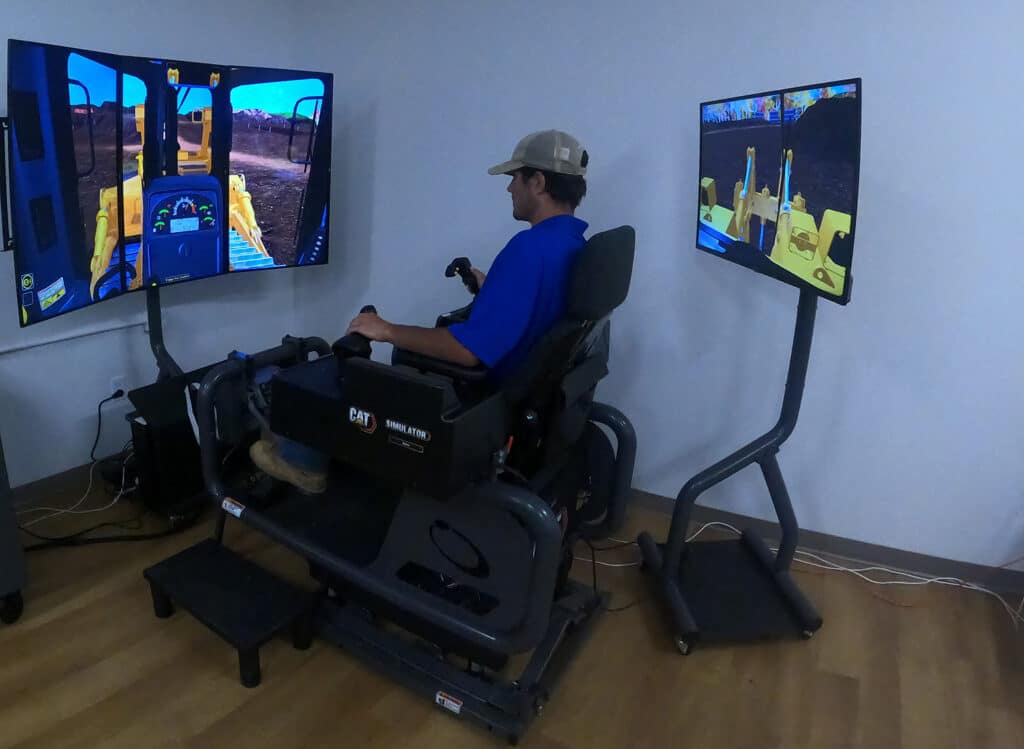
VR Edition
As the course progresses, Miranda introduces VR learning to the students as part of the course’s advanced section. He lets the students decide whether or not they want to use VR.
“It’s really good training. The students really like the VR and saw a difference when they went to the field,” said Miranda. “When we went back to Stowers’ yard, the students did really, really well. They were actually raking the green. One of the students who had never raked the green before, and barely had any experience operating equipment, was keeping the bucket straight as he went back within just a minute or two of getting into the machine. The VR works.”
Meeting Industry Training Needs
TCAT Knoxville Strategic Impact Coordinator Sally Porter explained that Stowers Cat and local construction industry leaders reached out to TCAT Knoxville for help in developing a heavy equipment operator training program last year. In November, a team traveled to Peoria, Illinois, to meet with the Simformotion team and learn more about Cat Simulators systems. Porter started the process to apply for grant funding after the visit.
“Before we knew it, the grant was approved, and we received the funding to pay for the program,” said Porter. “We recently received Workforce Investment Board funding. Sometimes they work directly with companies, or they work with individuals who are out of work. The funding will pay for the entire course for individuals.”
“We’re answering a call directly from the industry. There’s a need. They don’t have enough people.” Porter continued, “We have industry support. They want us to produce faster and train quicker. And then ultimately, they would like to see our program replicated across the state of Tennessee, in all TCATs. That’s their goal. There’s such a need for workers. And it’s also helping with their liability insurance. If we can show that their employees have safety training, that helps their worker’s compensation numbers.”
“We’re answering a call directly from the industry. There’s a need. They don’t have enough people.” Porter continued, “We have industry support. They want us to produce faster and train quicker. And then ultimately, they would like to see our program replicated across the state of Tennessee, in all TCATs. That’s their goal. There’s such a need for workers.
Simulator Training Benefits
Miranda explained there are many benefits to training students on simulators. “Local employers told me they will save maintenance costs on their machines by not using them to train with because sometimes inexperienced operators can be hard on equipment,” said Miranda. “They also do not want their machines tied up with training when it could be making money on the job site. And finally, they don’t have to invest time to train a person.”
“I think the ability to train on a simulator is the closest thing you can have to actually operating equipment. There’s nothing else like it out there.” Miranda explained, “I think the students are going to have a better start in a construction company. They know how to move the equipment from one place to another and how to do small tasks. They may not be able to grade a perfect grade with a bulldozer, but they are able to level some dirt and operate safely.”
“They know what the controls are, what the limits of the machine are and what can cause damage to the equipment because all of that is in the SimScholars™ curriculum. And they get the muscle memory, the repetitive motion of movement, from the simulators.” He added, “The employers can say they need this dirt moved from here to there and the new employee will be able to do it. Training on the simulators does work.”
